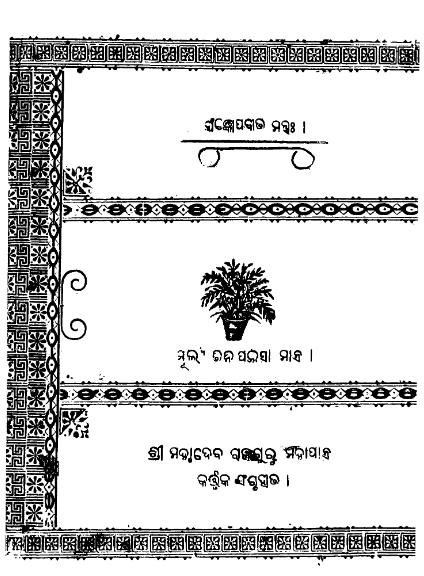Published in 1902, Yagyopabita Mantrah by Mahadeba Rajaguru Mahapatra stands as a distinctive contribution to the field of general knowledge in India. This book encapsulates a wealth of information drawn from various disciplines, reflecting both the intellectual rigor of its author and the cultural milieu of late 19th and early 20th-century India. It served as a vital resource for students and scholars seeking a comprehensive understanding of the world around them, embedding knowledge within the context of traditional Indian wisdom.
The turn of the century was a period of profound cultural and educational transformation in India, marked by the influence of Western thought and the resurgence of Indian identity. During this time, there was an increasing demand for educational materials that not only imparted knowledge but also celebrated Indian heritage and philosophy. Yagyopabita Mantrah emerged from this backdrop, aiming to bridge the gap between modern education and ancient Indian traditions.
At its core, Yagyopabita Mantrah is a compendium of general knowledge that spans a variety of subjects, including:
Philosophy and Religion: Exploring key concepts from Hindu philosophy, including the significance of rituals such as Yajna (sacred fire offerings), the book delves into spiritual wisdom and ethical teachings that are foundational to Indian culture.
History: The work provides an overview of significant historical events, figures, and movements, presenting readers with a contextual understanding of India’s past.
Science and Nature: Mahapatra incorporates scientific knowledge, explaining natural phenomena and advancements that were relevant to his time, thereby encouraging a scientific temper alongside cultural awareness.
Literature and Arts: The book also touches upon various forms of literature and artistic expressions, highlighting their roles in society and culture.
This multifaceted approach ensures that readers gain both a broad and nuanced understanding of the world, grounded in the richness of Indian intellectual tradition.
Yagyopabita Mantrah is characterized by its accessibility and clarity, making it suitable for a diverse readership. The organization of content allows readers to engage with each subject systematically, encouraging a cohesive learning experience. The combination of knowledge drawn from various sources enhances critical thinking and fosters a holistic view of learning.
Furthermore, the inclusion of mantras and verses from sacred texts adds an additional layer of cultural significance, reminding readers of the continuity of Indian knowledge systems through time. By intertwining modern general knowledge with traditional wisdom, Mahapatra’s work serves as a bridge connecting past and present learning.
The legacy of Yagyopabita Mantrah extends beyond its immediate educational impact. It represents an important era in Indian education, where there was an aspiration to create resources that were not only informative but also reflective of national identity and cultural pride. Mahadeba Rajaguru Mahapatra’s work paved the way for future generations of educators and writers who would continue to explore the integration of traditional knowledge with contemporary subjects.
Today, Yagyopabita Mantrah is regarded as a notable treasure in the study of Indian general knowledge. It serves as a vital resource for anyone seeking to understand the foundational ideas that shaped India’s educational landscape in the early 20th century.
Books Info
| Books name | Yagyopabita Mantrah / ଯଜ୍ଞପବୀତ ମନ୍ତ୍ର |
| Author | Mahadeba Rajaguru Mahapatra |
| No Of pages | 11 |
| Publisher | NA |
| Publication | 1902 |
| Printed At | NA |
| Distributor | NA |

